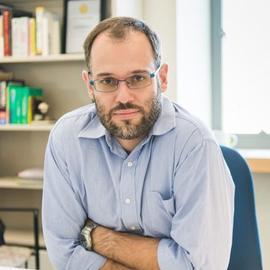Sebastian Deffner

Sebastian Deffner
Dr. Sebastian Deffner joined the QLab as part of its inaugural cohort of Fellows in 2023. He is an Associate Professor in the Physics Department at the University of Maryland Baltimore County (UMBC) and an Adjunct Assistant Professor in the Physics Department at the University of Maryland College Park (UMD). He was previously a Research Associate in the group of Christopher Jarzynski at UMD (2011-2014), and a Director’s Funded Postdoctoral Fellow with Wojciech H. Zurek at the Los Alamos National Laboratory (2014-2016). As a theoretical physicist focused on Quantum Thermodynamics, he employs tools from Statistical Physics, Open Quantum Dynamics, Quantum Information Theory, Quantum Optics, Condensed Matter Theory and Optimal Control Theory to investigate the nonequilibrium properties of nanosystems operating far from thermal equilibrium.
Dr. Deffner earned a masters degree in Physics in 2008 from University of Augsburg, Germany, and a doctorate in 2011 from University of Augsburg, Germany.
QLab Vision Statement
Despite the fact that the first demonstrations of quantum advantage have been published, currently available hardware is still prone to noise. Thus, it has been argued that we are in the era of noisy-intermediate scale quantum (NISQ) technologies. However, exploiting NISQ technologies often requires a different mathematical modeling framework. For instance, the D-Wave quantum annealer accepts an Ising spin-glass instance as its input and outputs solutions encoded in spin configurations. High-quality solutions are expected to be computed by these devices in a reasonable time, even for problems of the size which already bear practical relevance (currently, up to 5000 variables on a sparse graph). More importantly, a NISQ computer may not (yet) be able to outperform classical computers, however seeking and demonstrating amendable applications provides the instrumental guiding principle for the development of purpose-specific devices with genuine quantum advantage.